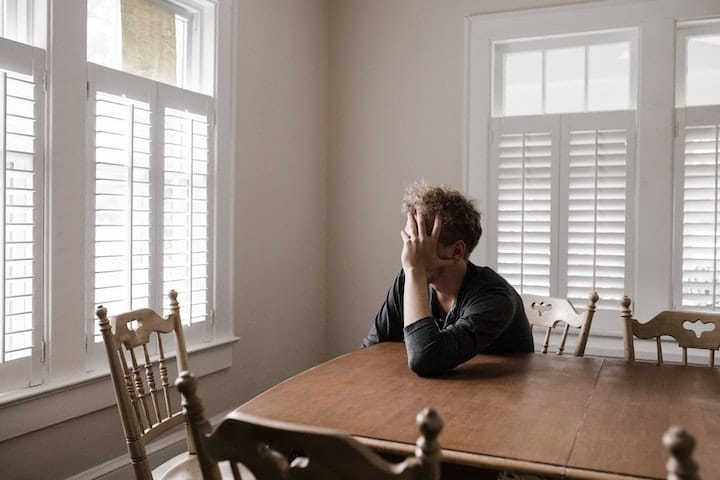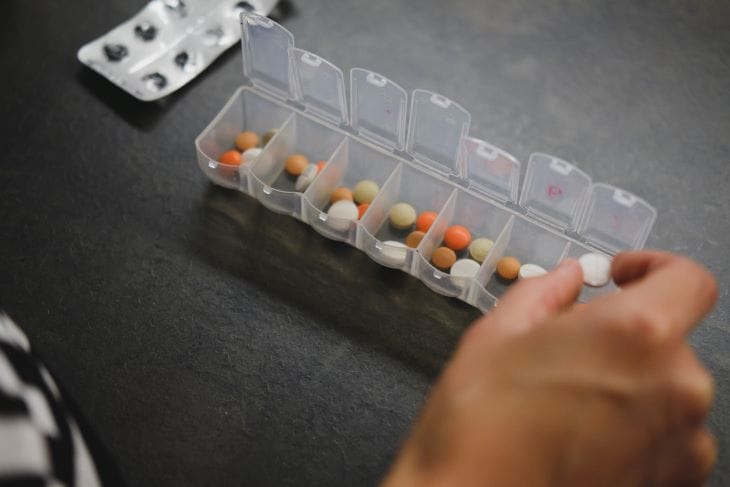Depression in itself is a complex, often challenging psychiatric disorder to manage. When an individual’s depression appears to be treatment-resistant, this can cause even further issues.
Depression is known to seriously impact an individual’s brain chemistry, especially in the long term.
Treatment-resistant is a term used to describe when an individual’s depression does not improve with treatment – either medication-based or through therapy.
This could also be categorised as a lack of response to treatment.
This can cause serious issues, as an individual may continue to struggle with the symptoms of their depression without seeming to recover from its effects, and, in some cases, this may continue to worsen over time, leading to additional risks in the long-term.
In some cases, individuals with Treatment-Resistant Depression (TRD) [1] may be misdiagnosed due to an initial misdiagnosis or lack of adequate antidepressant treatments, but it is still important to consider the fact that some forms of depression may be more or less likely to respond to treatment.
For professional help in tackling treatment-resistant depression today, call us on 0800 140 4690

It is difficult to say how many individuals who experience depression may be at risk of developing TRD.
This is because, as mentioned previously, these individuals may have often been misdiagnosed in the first place, leading to struggles in finding the correct treatment program for them.
However, medical professionals often track their patients’ symptoms carefully and over a long period of time in order to assess whether or not they are responding to treatment well, or if additional measures may need to be taken.
In many cases, if one particular treatment is not working as effectively as hoped, then the individual may be recommended to transition to another form of treatment – perhaps one that has a different basis to the methods they have tried before, or something that they may not have considered before.

The symptoms of TRD include the symptoms associated with depression but with the increased factor of lack of progress or trust in their treatment program.
This can cause additional stress on the individual, as any feelings of hopelessness or lack of ability to look at their condition in the long term may be reduced due to the lack of effect of their current treatment program.
Any failed treatment programs or attempts to help the individual return to healthy functioning and well-being can make the individual feel more and more hopeless when it comes to the future of their well-being and mental health.
When struggling with depression especially, these factors may cause the individual’s depression to worsen, leading to further developing symptoms and a low motivation to recover.
For professional help in tackling treatment-resistant depression today, call us on 0800 140 4690

In most cases, TRD is diagnosed when an individual fails to show any improvement after a variety of treatment programs that they may take part in.
In most studies, this is referred to as a failure ‘to restore a state of psychological wellness and high functioning’, [2] meaning that their symptoms of depression do not improve over time, even when engaging in specialised treatment programs, taking medication, or engaging with counselling and other therapies.
However, as mentioned previously, TRD is also one of the most common disorders to be misdiagnosed, most often due to a lack of proper treatment programs that are recommended, as well as a failure on the individual’s and their medical professional’s part to engage with full motivation in these programs.

Due to the multitude of different forms of depression, it is common for individuals can be misdiagnosed with different forms of depression – most of which will have a variety and range of symptoms that may not respond well to specific treatment techniques.
For example, if an individual is misdiagnosed with psychotic depression, then they may not respond to the psychiatric basis for this form of treatment, meaning that vital symptoms of their depression may go untreated and may worsen over time.
Other symptoms that are not associated with specific forms of depression may be overlooked, meaning that treatment programs focussed on specific symptoms of one form of depression are unlikely to be effective if the individual has been misdiagnosed in the first place.
The following subheadings outline this further, as well as some other features that may lead to a misdiagnosis.
As mentioned above, one of the main ways in which an individual may ‘develop’ TRD is due to the fact that they may not have TRD in the first place.
Often, if an individual is misdiagnosed in the early stages of treatment, then they are unlikely to make any progress toward recovery or overcoming their symptoms in general, leading to a false TRD diagnosis.
For example, if an individual is being treated for one form of depression, then their treatment program may not consider any progress that they make ‘effective’, meaning that they may not be considered to have made any progress.
If an individual is considered not to have made any progress, then they may be deemed treatment-resistant, which is often not the case if they have been subject to a misdiagnosis in the first place.

Widespread family-based and twin studies have determined that there are some genetic factors that can contribute to an individual’s risk of developing a depressive disorder. [3]
This means that if an individual has TRD (or any other form of depressive disorder), then their children are more likely to develop this disorder as well.
This is why it is vital that any parent who has TRD carefully monitors their children’s behaviour and encourages them to seek support and care at the earliest opportunity that they can, should they begin to experience any early signs or symptoms.
In some cases, an individual may be resistant to treatment for depressive disorders due to their metabolism.
If an individual’s depression treatment program is mainly based on medication and pharmacological treatment, then it is likely that their metabolic rate will have an increased impact on how well this form of treatment works.
For example, if an individual is known to have a high metabolic rate (i.e., their body processes and breaks down drugs, nutrition, and other substances more quickly than average), then this may impact how their body processes the drugs that they may have been prescribed for their depression.
A medical professional should always be made aware of these particular cases, and it may be suitable to increase or decrease the dosage depending on how quickly the individual’s body metabolises these substances.
For professional help in tackling treatment-resistant depression, call us on 0800 140 4690

As mentioned throughout this blog post, there are many challenges to correctly diagnosing an individual with TRD.
This is due to the multiple factors that may be in play when assessing an individual’s progress during treatment, as well as any other individual factors that may affect this.
In addition, there are many modern struggles in diagnosing depression in the first place due to the multiple ways in which it can be experienced, the different signs and symptoms, as well as each individual case being different.
Though it may be helpful for some medical professionals to refer to diagnosis tools such as the DSM (Diagnostical and Statistical Manual), there are many symptoms of depression especially that are overlooked, not common enough to include, or slightly deviating from the official wording, making for a more challenging process of diagnosis in general.
Use of the DSM-5 especially can have serious flaws when it comes to recommending future treatment. [4]

In some cases, disorders such as depression can lead to other disorders, medical conditions, and mental health conditions – either the worsening of an existing disorder or the development of a co-occurring disorder.
One of the most common co-occurring disorders with depression is the development of an addiction, also known as a substance use disorder.
Other common co-occurring disorders include bipolar disorder and anxiety disorder, but these also have strong links to depression and its effects on an individual.
This is where the individual becomes dependent on a particular substance or substances, meaning that their general health (both physical and mental) can often struggle further than when they struggled with depression alone.
If an individual develops an addiction, then it is vital that they seek suitable support as soon as they are able.
Many individuals may be resistant to rehabilitation, for example, but there are steps that can be taken to ensure that individuals struggling with addiction and co-occurring disorders get the help that they need.
For professional help in tackling treatment-resistant depression, call us on 0800 140 4690

In many cases, there are steps that can be taken to ensure that individuals who are struggling from TRD and severe depression can actually find and engage in an effective treatment of depression that is suitable for them.
Every individual can find a treatment program that is suitable for them, even if the program itself takes a long period of time to find or to begin improving their condition.
The following subheadings outline some of the key ways in which someone with TRD may begin to find help, and some alternatives to regular forms of treatment that they may have been recommended throughout the period of their diagnosis.
In most cases, there are a number of steps that can be taken in order to find an effective and supportive initial treatment style for each individual case.
Different treatment strategies should always be considered.
This often includes careful supervision of what works and what doesn’t work within each treatment program, as well as flexibility within treatment programs in order to quickly get rid of what isn’t working and explore further what may be working more effectively.
In all cases, each individual should be treated as such, as the concept of a ‘one-size-fits-all’ approach to care is not appropriate.
This is because every individual is different and, especially when it comes to TRD, every step of the process should be specifically tailored and specialised to their individual case.

Though not often the first thing that should be considered, some forms of depression may require antidepressant medication in the early stages of care, rather than just counselling or other forms of therapy.
Though medication can take a few months for the individual to feel the full benefit, the sooner they begin a course of medication, the higher their chances of feeling the benefits sooner.
Many forms of depression medication can actually increase the individual’s symptoms of depression within the early stages of the course of treatment, so this should always be kept in mind when starting medication or switching to a new type of pharmacological intervention.
Antidepressant effects vary from individual to individual, so finding the right medication or combination of medications for you is essential. However, these medications should always be prescribed medications, not something that has been recommended casually by a friend or someone you know.
Counselling, a form of therapy, is known to be one of the best treatment steps for an individual who is struggling with depression.
This is because most forms of counselling can be specialised to each individual’s needs, focussed on their specific issues, and flexible to the changing needs and demands of treatment.
This often includes behavioural therapy – one of the most effective interventions for treatment of both mental health disorders and addictions.
In addition, counselling is often undertaken on a one-to-one basis, meaning that flexibility and changes can be made on short notice and to match the individual’s changing needs.
This is generally the first option that individuals are recommended when entering treatment as it is non-invasive and cognitive-based – one of the key aspects of depression, in general, and specifically for TRD.
No matter how many weeks of treatment these people with depression may undergo, it is vital that strong motivation and a good attitude are maintained to get the most out of their care.

There are many challenges associated with living with depression, not only due to the mental pressures that it places on someone, but also in the ways that it affects their daily life.
Someone who struggles with depression may also experience effects to their work/school life, their social life, and their physical health over time.
When combined with the fact that they may have been told that their condition is untreatable, this can often worsen.
This is why it is vital that an individual consults with a medical professional regularly in order to keep trying new forms of treatment, remain flexible in their care, and maintain motivation moving into the future.
There are countless options for someone to receive support for depression, and there are always new treatments being developed, so help may often be closer than you think.
For professional help in tackling treatment-resistant depression, call us on 0800 140 4690

To learn more about depression, its effects on the mind and body, and to look at different treatment options, get in contact with a medical professional today to start your journey to recovery.
Rehab 4 Addiction can help patients with depression and any related issues, whether they be personal difficulties or problems with addiction.
If you’re ready to tackle your demons and take back control of your life, contacting us directly on 0800 140 4690